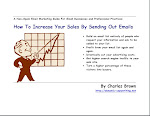As a freelance copywriter, I am always reading books on marketing, writing and advertising in order to hone my skills. I was just rereading Jeffrey J. Fox’s marvelous book, How To Become A Marketing Superstar this week, and had to start jotting down some notes to pass along. Fox has a wonderful knack for distilling his hard-won wisdom into two or three page chapter nuggets that others would have to teach an entire college semester to get across.
Here are a few of my favorites:
- NEVER USE WE. Eliminate the personal pronouns "I," "me," "we," "us," or "our" in advertising, packaging, sales literature or anywhere else in marketing communications. "We" is about the marketer and its story. "We" is in the first person. "We" is a bad proxy for your brand name or company name.
A freelance copywriter's job is to draw the customer into the conversation by focusing on her and her story, her concerns, her headaches, her wants. Your job is to build brand awareness, not "we’ awareness…Never use "we," "us," or "our" in the headline.
The advertisement is not about you, it is not about your success or experience or hard work. It is about the customer and what the product will do for her or him. To confound this sin, these same advertisers often follow their "we" with trite clichés like, "We put customers first," or, "We are committed to excellence."
· - SELL CONSEQUENCES. Always communicate the consequences to the customer of going without your product…It is always more effective to influence the customer by showing the cost, damage or loss they incurring right now by going without your product. Few customers knowingly ignore consequences and then deliberately buy an alternative product on the basis of a lower price alone.…What is it costing your prospect right now to not be doing business with you each month? What other consequences will occur if she delays taking action right now?
· - DIFFERENCES. If you flip through any small stack of magazines you will quickly find many examples of ads that inform of such things as "our people make the difference," or "little details make all the difference," "feel the difference," or even, "the right choice makes all the difference." These are all signs of lazy marketers who have not taken the effort to think through what makes their product "different." And yet it is these differences that are your selling points and even your competitive edges (or are they just "wishful differences" with your competitor having the real competitive edge.) If the marketer is too lazy to think through the differences and articulate them, how can he expect the customer to do it for him? If you can’t illustrate to the customer why your widget is different and better than the Brand X widget, he will either choose based upon price, or by what his cousin Ernie thinks he once heard someone say about your brand).
·
I recommend this book to any marketer or freelance copywriter who wants to compel more customers to buy your products or services. If you haven’t read How To Become A Marketing Superstar yet, go pick up a copy. I’d loan you mine, but I’m still rereading it.
COPYRIGHT © 2006, Charles Brown
Labels: advertising, copywriting



0 comments:
Post a Comment